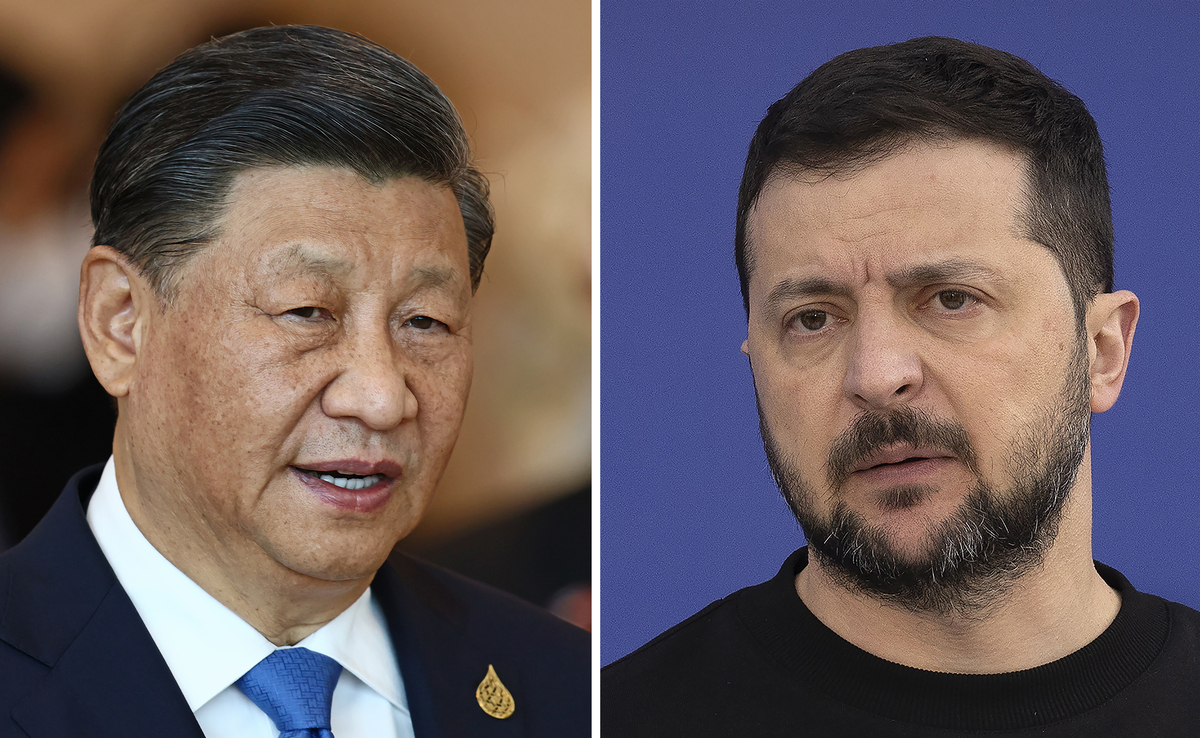[ad_1]

This combination of file photos shows China’s President Xi Jinping, taken in Bangkok, Thailand, on Nov. 19, 2022, and Ukrainian President Volodymyr Zelenskyy, taken outside Kyiv, Ukraine, on April 7, 2023. Chinese leader Xi talked Wednesday with Ukrainian President Zelenskyy.
AP
hide caption
toggle caption
AP

This combination of file photos shows China’s President Xi Jinping, taken in Bangkok, Thailand, on Nov. 19, 2022, and Ukrainian President Volodymyr Zelenskyy, taken outside Kyiv, Ukraine, on April 7, 2023. Chinese leader Xi talked Wednesday with Ukrainian President Zelenskyy.
AP
Chinese leader Xi Jinping called Ukraine’s President Volodymyr Zelenskyy, over a month after Xi’s summit in Moscow with Russia’s leader Vladimir Putin.
Xi made the call to Zelenskyy after weeks of intensifying pressure from Western leaders to use his influence with Putin to broker a deal toward ending the war in Ukraine, which began with Russia’s invasion in late February 2022.
It was the first call between Xi and Zelenskyy since the Russian invasion, the Ukrainian government said. China said it happened on Wednesday, at the invitation of Zelenskyy.
Writing on Twitter, Zelenskyy said the call was “long and meaningful” but did not offer specifics on whether they talked of ways of finding an end to the conflict. The call lasted almost an hour, according to a Ukrainian government post on the Telegram messaging app.
I had a long and meaningful phone call with 🇨🇳 President Xi Jinping. I believe that this call, as well as the appointment of Ukraine’s ambassador to China, will give a powerful impetus to the development of our bilateral relations.
— Володимир Зеленський (@ZelenskyyUa) April 26, 2023
A Chinese government readout after the call said it will send a special representative “to Ukraine and other countries to have in-depth communication with all parties on the political settlement of the Ukraine crisis.”
“As a permanent member of the UN Security Council and a responsible major country, China would not sit idly by, nor would it add oil to the fire, still less exploit the situation for self gains,” the Chinese government said. “No matter how the international landscape changes, China is willing to work with the Ukrainian side to move forward the mutually beneficial cooperation between the two countries.”
Following the conversation with Xi, Zelenskyy’s office announced he has appointed Pavlo Riabikin as ambassador to China, a post that has been vacant for two years.
Xi and Zelenskyy’s call comes as the Chinese leader has sought to play the role of international peacemaker, having brokered a deal to mend fences between Middle Eastern rivals Iran and Saudi Arabia.
However, chances of a breakthrough in the Ukraine conflict are slim, given how far apart Moscow and Kyiv’s positions remain, especially on the issue of Russian-occupied Ukrainian territory.
Russia occupies large portions of eastern Ukraine and Crimea, and Kyiv insists no talks are possible until Moscow withdraws from Ukrainian territory. Even a cease-fire, Ukraine says, will only allow Moscow time to regroup in its faltering military campaign. Ukraine rejected a 36-hour Russian cease-fire over Orthodox Christmas.
Analysts say Ukraine is gearing up for a spring counteroffensive, which could start soon, in an attempt to take back Russian-occupied land. The success or failure of those operations could dramatically reshape the conflict, and potentially create the conditions that would makes talks more feasible to both sides.
Speaking to NPR on Monday, President Zelenskyy’s chief of staff, Andriy Yermak, said the government welcomes a role for China in peace efforts, even if Kyiv does not accept Beijing’s plan.
“We appealed to China and presented President Zelenskyy’s peace plan,” Yermak said. “Of course we can’t say that we accept China’s plan or political position, but it’s good that they are ready to be involved. We are looking for contact between President Zelenskyy and President Xi because we think it’s the best way to listen, personally, between our presidents.”
The Chinese leader, having recently secured an unprecedented third term as president, seeks to burnish China’s international credentials amid deeply stressed ties with the United States and increasingly difficult ones with Europe. Countries there view China’s close ties with Russia — their “no limits” partnership — with growing suspicion and skepticism.
Earlier this week, the Chinese ambassador to France caused outrage in Europe by questioning whether former Soviet republics are sovereign states under international law. China’s Foreign Ministry tried to walk back the remarks saying it respects the sovereignty of former Soviet republics.
Beijing’s ties are also frayed with Western countries on issues ranging from trade and human rights to concerns over Taiwan.
China called for a cease-fire and peace talks between Russia and Ukraine, in a position paper released on the first anniversary of Russia’s invasion on Feb. 24.
“Dialogue and negotiation are the only viable solution to the Ukraine crisis,” the 12-point position paper stated. “All efforts conducive to the peaceful settlement of the crisis must be encouraged and supported.”
Since then, Zelenskyy has requested an audience with Xi but has been skeptical of the proposal, given Beijing’s close ties with Moscow. Washington essentially dismissed the proposal, saying China was not a neutral arbiter in this conflict.
Hanna Palamarenko contributed reporting from Kyiv, Ukraine.
[ad_2]
Source link




